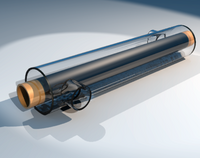
Photo from wikipedia
Abstract The condensing flow of R1234yf in a smooth horizontal helically coiled tube is studied experimentally to achieve the heat transfer coefficient and frictional pressure gradient. The helical coil diameter… Click to show full abstract
Abstract The condensing flow of R1234yf in a smooth horizontal helically coiled tube is studied experimentally to achieve the heat transfer coefficient and frictional pressure gradient. The helical coil diameter is 95.3 mm with a constant pitch of 16.7 mm and is made by coiling a flexible smooth tube with an internal diameter of 8.2 mm. The effect of vapor quality, mass velocity and saturation temperature on the two-phase heat transfer coefficient and frictional pressure gradient are investigated. The experiments are carried out at saturation temperatures of 20 °C and 30 °C for the mass velocity ranging from 95 kg m−2 s−1 to 285 kg m−2 s−1 and vapor quality from 0.1 to 0.8. In addition, the experimental results of the helically coiled tube are compared with those achieved for a straight smooth tube at the same operating conditions to evaluate the effect of coiling on the condensation heat transfer and frictional pressure gradient. The results suggest that the average heat transfer coefficients of the helically coiled tube are 60–120% higher than those of the straight tubes with the penalty of 46–108% for the frictional pressure gradient. Considering both thermal and hydraulic performances, the Performance Evaluation Criteria (PEC) is defined. The values of PEC are varied between 0.91 and 1.52 while the highest PECs are observed for the intermediate mass velocity of 190 kg m−2 s−1. New correlations to estimate the heat transfer coefficient and frictional pressure gradient are suggested based on the experimental results of the current study.
Journal Title: International Journal of Thermal Sciences
Year Published: 2020
Link to full text (if available)
Share on Social Media: Sign Up to like & get
recommendations!